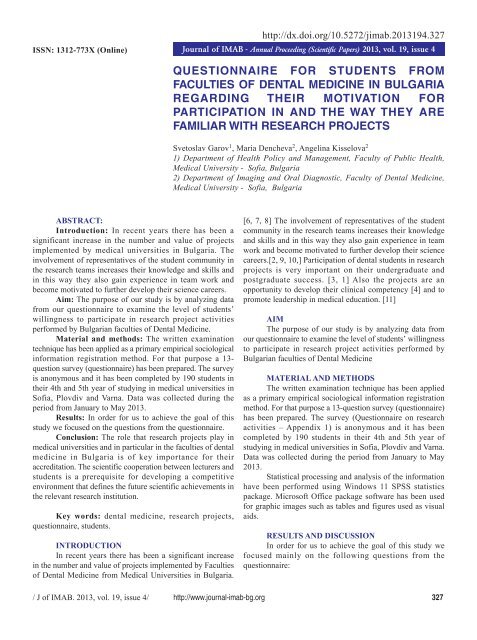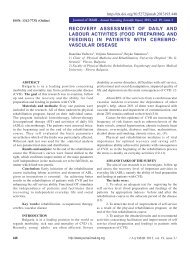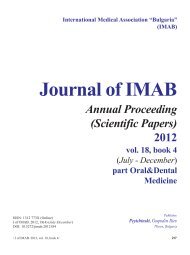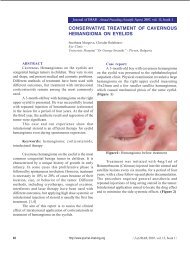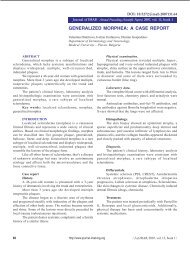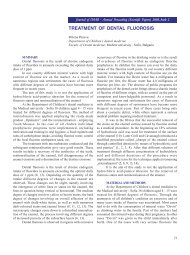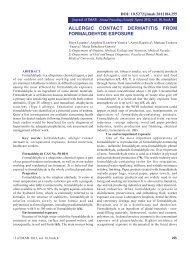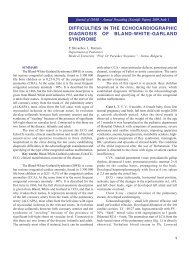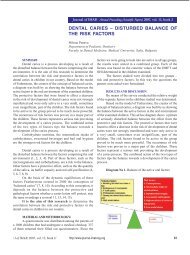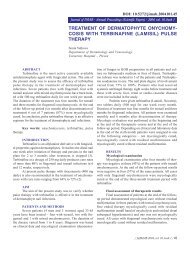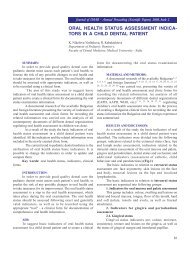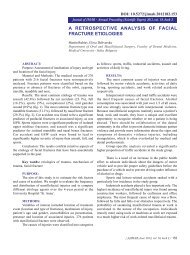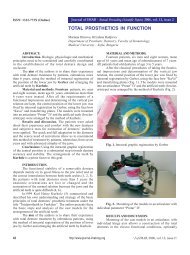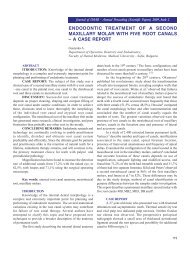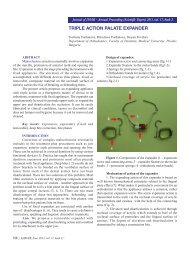QUESTIONNAIRE FOR STUDENTS FROM ... - Journal of IMAB
QUESTIONNAIRE FOR STUDENTS FROM ... - Journal of IMAB
QUESTIONNAIRE FOR STUDENTS FROM ... - Journal of IMAB
Create successful ePaper yourself
Turn your PDF publications into a flip-book with our unique Google optimized e-Paper software.
ISSN: 1312-773X (Online)<br />
http://dx.doi.org/10.5272/jimab.2013194.327<br />
<strong>Journal</strong> <strong>of</strong> <strong>IMAB</strong> - Annual Proceeding (Scientific Papers) 2013, vol. 19, issue 4<br />
<strong>QUESTIONNAIRE</strong> <strong>FOR</strong> <strong>STUDENTS</strong> <strong>FROM</strong><br />
FACULTIES OF DENTAL MEDICINE IN BULGARIA<br />
REGARDING THEIR MOTIVATION <strong>FOR</strong><br />
PARTICIPATION IN AND THE WAY THEY ARE<br />
FAMILIAR WITH RESEARCH PROJECTS<br />
Svetoslav Garov 1 , Maria Dencheva 2 , Angelina Kisselova 2<br />
1) Department <strong>of</strong> Health Policy and Management, Faculty <strong>of</strong> Public Health,<br />
Medical University - S<strong>of</strong>ia, Bulgaria<br />
2) Department <strong>of</strong> Imaging and Oral Diagnostic, Faculty <strong>of</strong> Dental Medicine,<br />
Medical University - S<strong>of</strong>ia, Bulgaria<br />
ABSTRACT:<br />
Introduction: In recent years there has been a<br />
significant increase in the number and value <strong>of</strong> projects<br />
implemented by medical universities in Bulgaria. The<br />
involvement <strong>of</strong> representatives <strong>of</strong> the student community in<br />
the research teams increases their knowledge and skills and<br />
in this way they also gain experience in team work and<br />
become motivated to further develop their science careers.<br />
Aim: The purpose <strong>of</strong> our study is by analyzing data<br />
from our questionnaire to examine the level <strong>of</strong> students’<br />
willingness to participate in research project activities<br />
performed by Bulgarian faculties <strong>of</strong> Dental Medicine.<br />
Material and methods: The written examination<br />
technique has been applied as a primary empirical sociological<br />
information registration method. For that purpose a 13-<br />
question survey (questionnaire) has been prepared. The survey<br />
is anonymous and it has been completed by 190 students in<br />
their 4th and 5th year <strong>of</strong> studying in medical universities in<br />
S<strong>of</strong>ia, Plovdiv and Varna. Data was collected during the<br />
period from January to May 2013.<br />
Results: In order for us to achieve the goal <strong>of</strong> this<br />
study we focused on the questions from the questionnaire.<br />
Conclusion: The role that research projects play in<br />
medical universities and in particular in the faculties <strong>of</strong> dental<br />
medicine in Bulgaria is <strong>of</strong> key importance for their<br />
accreditation. The scientific cooperation between lecturers and<br />
students is a prerequisite for developing a competitive<br />
environment that defines the future scientific achievements in<br />
the relevant research institution.<br />
Key words: dental medicine, research projects,<br />
questionnaire, students.<br />
INTRODUCTION<br />
In recent years there has been a significant increase<br />
in the number and value <strong>of</strong> projects implemented by Faculties<br />
<strong>of</strong> Dental Medicine from Medical Universities in Bulgaria.<br />
[6, 7, 8] The involvement <strong>of</strong> representatives <strong>of</strong> the student<br />
community in the research teams increases their knowledge<br />
and skills and in this way they also gain experience in team<br />
work and become motivated to further develop their science<br />
careers.[2, 9, 10,] Participation <strong>of</strong> dental students in research<br />
projects is very important on their undergraduate and<br />
postgraduate success. [3, 1] Also the projects are an<br />
opportunity to develop their clinical competency [4] and to<br />
promote leadership in medical education. [11]<br />
AIM<br />
The purpose <strong>of</strong> our study is by analyzing data from<br />
our questionnaire to examine the level <strong>of</strong> students’ willingness<br />
to participate in research project activities performed by<br />
Bulgarian faculties <strong>of</strong> Dental Medicine<br />
MATERIAL AND METHODS<br />
The written examination technique has been applied<br />
as a primary empirical sociological information registration<br />
method. For that purpose a 13-question survey (questionnaire)<br />
has been prepared. The survey (Questionnaire on research<br />
activities – Appendix 1) is anonymous and it has been<br />
completed by 190 students in their 4th and 5th year <strong>of</strong><br />
studying in medical universities in S<strong>of</strong>ia, Plovdiv and Varna.<br />
Data was collected during the period from January to May<br />
2013.<br />
Statistical processing and analysis <strong>of</strong> the information<br />
have been performed using Windows 11 SPSS statistics<br />
package. Micros<strong>of</strong>t Office package s<strong>of</strong>tware has been used<br />
for graphic images such as tables and figures used as visual<br />
aids.<br />
RESULTS AND DISCUSSION<br />
In order for us to achieve the goal <strong>of</strong> this study we<br />
focused mainly on the following questions from the<br />
questionnaire:<br />
/ J <strong>of</strong> <strong>IMAB</strong>. 2013, vol. 19, issue 4/ http://www.journal-imab-bg.org 327
I. Application procedure awareness – Question No 2.<br />
92.1% <strong>of</strong> the students have given negative answers to<br />
the question regarding the awareness <strong>of</strong> the major steps in<br />
applying for competition programs – idea, cost analysis, team<br />
formation, submitting documents and implementation stages.<br />
The results obtained are completely logical and correspond<br />
to their position in the education institution.<br />
II. Research project participation – Question No 3.<br />
95.3% <strong>of</strong> the students surveyed claim not to have<br />
participated in research projects, which is directly correlated<br />
to their answers to the question <strong>of</strong> their awareness <strong>of</strong><br />
application procedures (i.e. Question No 2). Such answers<br />
prove the need <strong>of</strong> a more detailed information campaign<br />
among students aimed at explaining the benefits and ways <strong>of</strong><br />
participation in research projects - Fig. 1.<br />
IV. Research project implementation – difficulty level<br />
– Question No 5.<br />
Students’ answers clearly show that they do not have<br />
any illusions about the complexity involved in research project<br />
implementation and that they are aware <strong>of</strong> the high level <strong>of</strong><br />
work load related to such implementation. Results from the<br />
questionnaire participants’ opinions summary show<br />
indisputable facts according to which 80.8% consider project<br />
implementation procedures as a difficult task and 14.7% – as<br />
a very difficult one - Fig. 3.<br />
level<br />
Fig. 3. Research project implementation – difficulty<br />
Fig. 1. Students’ participation in research projects<br />
II². Willingness and motivation to participate in<br />
research project activities – Question No 4.<br />
Our data collected from all three faculties <strong>of</strong> Dental<br />
Medicine reveals that only 4.7% <strong>of</strong> the students have<br />
participated in research projects while at the same time 54.2%<br />
express their explicit willingness to do so. Availability <strong>of</strong><br />
enough time for participation in such auxiliary activities ranks<br />
second as a precondition for students’ involvement. Only<br />
3.2% find financial stimulus for participation as the most<br />
important one - Fig. 2.<br />
V. Research activity unit members – Question No 7.<br />
This question was meant to study opinions regarding<br />
research activity unit members with the purpose <strong>of</strong><br />
establishing such a unit in the relevant faculty or its<br />
optimization corresponding to the dynamics <strong>of</strong> development<br />
in the relevant field – Fig. 4.<br />
Fig. 4. Research activity unit members<br />
Fig. 2. Students’ participation in research project<br />
activities<br />
328 http://www.journal-imab-bg.org / J <strong>of</strong> <strong>IMAB</strong>. 2013, vol. 19, issue 4/
Result data is as follows: 20% <strong>of</strong> the students think<br />
that such structure should include academic rank lecturers<br />
only and 69.3% share the opinion that it should involve<br />
academic rank lecturers, lawyers, accountants, etc., which<br />
shows clear awareness <strong>of</strong> the multidisciplinary nature <strong>of</strong><br />
research project activities. The third considerable group <strong>of</strong><br />
answers is also interesting – 18.7% <strong>of</strong> the students give<br />
individual answers different from the proposed ones and those<br />
participants insist on involving other people such as lecturers<br />
not having any academic ranks, consultants, students’<br />
representatives, supporting staff representatives (nurses,<br />
sanitary attendants), etc. Students aware that the unit in charge<br />
<strong>of</strong> projects should comprise <strong>of</strong> a large number <strong>of</strong> experts<br />
express their somewhat intuitive opinion on the involvement<br />
<strong>of</strong> people with different occupations, which could ensure<br />
optimization <strong>of</strong> the activities performed.<br />
VI. Student’s participation in research projects –<br />
Question No 8.<br />
In our opinion and in the opinion <strong>of</strong> most lecturers who<br />
filled in the questionnaire the involvement <strong>of</strong> students as part<br />
<strong>of</strong> the research team is <strong>of</strong> great significance since it provides<br />
opportunities for gaining new knowledge and experience in<br />
team work. As far as the educational institution is concerned<br />
research projects are treated as some kind <strong>of</strong> a “workshop”<br />
for future young research personnel - Fig. 5.<br />
Fig. 6. Advantages <strong>of</strong> students’ participation in<br />
research projects<br />
VIII. Disadvantages <strong>of</strong> students’ participation in<br />
research projects - Question No 10.<br />
Fig. 7. Disadvantages <strong>of</strong> students’ participation in<br />
research projects<br />
Fig. 5. Student’s participation in research projects<br />
VII. Advantages <strong>of</strong> research project participation –<br />
Question No 9.<br />
Major advantages <strong>of</strong> such participation according to<br />
students are: the possibility to experience work with<br />
innovative technologies and special equipment (61.1%) and<br />
the joint team work with their lecturers; presenting research<br />
results at various forums (33.7%) Fig. 6.<br />
According to students (69.5%) the main difficulty<br />
regarding their participation in research projects is the<br />
additional burden that such participation represents. Only<br />
26.8% <strong>of</strong> them find it difficult to combine project activities<br />
with education, obviously estimating that such participation<br />
will not be a serious problem if organization is good.<br />
IX. What is FP7 – Question No 11.<br />
The question related to FP7 was aimed at estimating<br />
to what extent the students surveyed had knowledge <strong>of</strong> the<br />
various scientific cooperation programs. It turned out that half<br />
<strong>of</strong> them, 51%, give the correct answer that FP7 is an<br />
international scientific cooperation program - Fig. 8. We<br />
consider that this percentage could be much higher in cases<br />
<strong>of</strong> active information campaigns held by the relevant<br />
university specialized unit. [5]<br />
/ J <strong>of</strong> <strong>IMAB</strong>. 2013, vol. 19, issue 4/ http://www.journal-imab-bg.org 329
Fig. 8. Knowledge <strong>of</strong> FP7<br />
X. Method <strong>of</strong> obtaining up-to-date information –<br />
Question No 13.<br />
Most students prefer to obtain information about<br />
research projects both from the Internet and from specialized<br />
units at the Faculties <strong>of</strong> Dental Medicine (FDM) (59.5%) –<br />
Fig. 9. This shows Bulgarian dental medicine students’<br />
hunger for more sources <strong>of</strong> up-to-date scientific information.<br />
Fig. 9. Ways <strong>of</strong> receiving information according to<br />
students’ demands<br />
CONCLUSION<br />
The role that research projects play in medical<br />
universities and in particular in the faculties <strong>of</strong> dental<br />
medicine in Bulgaria is <strong>of</strong> key importance for their<br />
accreditation. Extracurricular activities and other forms <strong>of</strong><br />
education resulting in earning credits appear as a stepping<br />
stone for selecting the best prepared students and their<br />
involvement in a particular project research team. This form<br />
<strong>of</strong> scientific cooperation between lecturers and students is a<br />
prerequisite for developing a competitive environment that<br />
defines the future scientific achievements in the relevant<br />
research institution.<br />
Appendix 1<br />
(Questionnaire regarding research activities performed in faculties <strong>of</strong> Dental Medicine in Bulgaria)<br />
Question<br />
No<br />
1. What is your status in the Faculty<br />
2. Are you familiar with the research<br />
project application procedure<br />
3. Have you participated in a research<br />
project at your university<br />
4. Would you like to participate in<br />
application for a research project<br />
<strong>QUESTIONNAIRE</strong><br />
Question<br />
À<br />
B<br />
C<br />
Academic rank Employee/lecturer <strong>of</strong><br />
lecturer<br />
no academic rank<br />
Yes<br />
No<br />
Yes<br />
No<br />
Yes<br />
No<br />
Student<br />
Only if I have<br />
free time<br />
D<br />
Only if the pay<br />
is good<br />
5. In your opinion a research project<br />
implementation is:<br />
Very difficult<br />
Difficult<br />
Easy<br />
Very easy<br />
6. What is your opinion on establishing<br />
a unit at the Faculty <strong>of</strong> Dental Medicine<br />
dedicated especially to implement<br />
Definitely positive<br />
Positive<br />
Negative<br />
Definitely<br />
negative<br />
research projects:<br />
330 http://www.journal-imab-bg.org / J <strong>of</strong> <strong>IMAB</strong>. 2013, vol. 19, issue 4/
7. What members could such unit<br />
include<br />
8. In your opinion the involvement <strong>of</strong><br />
students in research projects is:<br />
9. In your opinion what are the<br />
advantages for research project<br />
participants (please specify one answer<br />
only)<br />
10. What are the disadvantages for<br />
research project participants<br />
11. What do you think the Seventh<br />
Framework Program is<br />
12. How many research projects do you<br />
think are implemented at your Faculty in<br />
one year<br />
13. How do you prefer to receive<br />
information about certain projects<br />
Academic ranks<br />
only<br />
Obligatory<br />
Working with<br />
innovative<br />
technologies<br />
Difficulties in<br />
combining project<br />
activities with<br />
education /lecturing<br />
National scientific<br />
cooperation<br />
program<br />
Not more than 10<br />
On the Internet<br />
Academic ranks,<br />
accountants, lawyers,<br />
etc.<br />
Positive<br />
Participation in<br />
science forums<br />
Additional extra time<br />
burden<br />
International scientific<br />
cooperation program<br />
Between 10 and 20<br />
From specified units<br />
at the Faculties <strong>of</strong><br />
Dental Medicine<br />
Others (please<br />
specify):<br />
Negative<br />
Financial<br />
stimuli<br />
Others (please<br />
specify):<br />
Sports program<br />
Between 20 and<br />
40<br />
From both<br />
sources<br />
Students<br />
should not<br />
participate<br />
Others (please<br />
specify):<br />
Other (please<br />
specify):<br />
More than 40<br />
I do not want to<br />
receive any<br />
information<br />
REFERENCES:<br />
1. Divaris K, Barlow PJ, Chendea<br />
SA, Cheong WS, Dounis A, Dragan IF,<br />
et al. The academic environment: the<br />
students’ perspective. Eur J Dent<br />
Educ. 2008 Feb;12(Suppl 1):120-30.<br />
[PubMed] [CrossRef]<br />
2. Franzen C, Brown G.<br />
Undergraduate degree projects in the<br />
Swedish dental schools: a documentary<br />
analysis. Eur J Dent Educ. 2013 May;<br />
17(2):122–126. [PubMed] [CrossRef]<br />
3. Guven Y, Uysal O. The<br />
importance <strong>of</strong> student research projects<br />
in dental education. Eur J Dent Educ.<br />
2011 May;15(2):90–97. [PubMed]<br />
[CrossRef]<br />
4. Henzi D, Davis E, Jasinevicius R,<br />
Hendricson W. North American dental<br />
students’ perspectives about their<br />
clinical education. J Dent Educ.<br />
2006 Apr 1;70(4):361-377. [PubMed]<br />
5. http://ec.europa.eu/research/fp7/<br />
6. http://mu-s<strong>of</strong>ia.bg/en/node/429<br />
7. http://meduniversity-plovdiv.bg/<br />
en/projects/1080-art_projectsengl<br />
8. http://mu-varna.bg/EN/Research/<br />
Pages/ProjectsAndPrograms.aspx<br />
9. Leisnert L, Karlsson M, Franklin<br />
I, Lindh L, Wretlind K. Improving<br />
teamwork between students from two<br />
pr<strong>of</strong>essional programmes in dental<br />
education. Eur J Dent Educ. 2012<br />
Feb;16(1):17–26. [PubMed] [CrossRef]<br />
10. McAndrew M, Community-<br />
Based Dental Education and the<br />
Importance <strong>of</strong> Faculty Development, J<br />
Dent Educ. 2010 Sep 1;74(9):980-985.<br />
[PubMed]<br />
11. Steinert Y, Naismith L, Mann K.<br />
Faculty development initiatives<br />
designed to promote leadership in<br />
medical education. A BEME systematic<br />
review: BEME Guide No. 19. Med<br />
Teach. 2012; 34(6):483-503. [PubMed]<br />
[CrossRef]<br />
Address for correspondence:<br />
Dr. Svetoslav Garov<br />
Department <strong>of</strong> Health Policy and Management, Faculty <strong>of</strong> Public Health,<br />
Medical University - S<strong>of</strong>ia<br />
8, Bialo more str., 1527, S<strong>of</strong>ia, Bulgaria<br />
E-mail: sv.garov@gmail.com<br />
/ J <strong>of</strong> <strong>IMAB</strong>. 2013, vol. 19, issue 4/ http://www.journal-imab-bg.org 331


